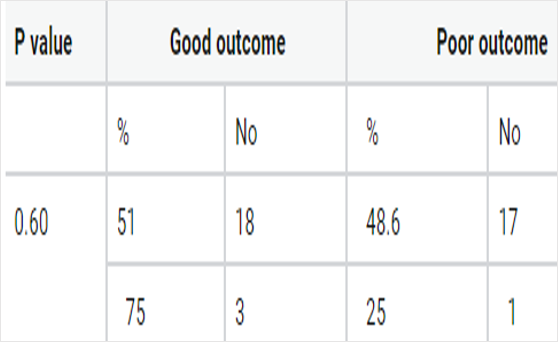Abstract
Penetrating brain injury (PBI) is any injury that causes penetration of the scalp, skull, meninges, and brain. It is a traumatic brain injury caused by either low-velocity sharp objects, high-velocity projectiles or blast injury is the consequence of the detonation of complex explosives with or without PBI and closed head injury. To evaluate the factors that affect the surgical outcome of civilian PBI. The data include thirty-nine (39) operated patients with PBI. Data information includes the Glasgow Coma Scale (GCS), radiological investigations (computerized tomov graphy (CT-scan) and plain X-ray) the outcome determined by Glasgow Outcome Score (GOS). The surgical outcome of the penetrating head injury in this study was assessed by GOS and was as follow, good recovery 10 patients (25.6%), moderately disabled 11 patients (28.2%), severely disabled 5 patients (12.8%), vegetative 6 patients (15.4%), Dead 7 patients (18.0%). Good outcome 21 patients 53.8% while poor outcome 18 patients 46.2%. GCS is significant factor (p-value = 0.002), time not affecting, CT-finding is significant factor (p-value = 0.000), blood pressure >= 90 mm Hg is a good predictor factor (p-value =0.001), speech difficulty is poor predictor factor (p-value = 0.004), outcome of inlet alone better than inlet and outlet. There are many factors affecting the surgical outcome in civilian penetrating head injury, and the significant factor is pre-operative GCS, CT-scan which is the best radiological investigation for pre-operative and post-operative assessment and show the details of the injury, blood pressure > = 90 mm Hg which is a good prognostic factor.
Full text article
Authors

This work is licensed under a Creative Commons Attribution-NonCommercial-NoDerivatives 4.0 International License.

